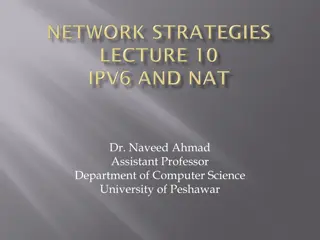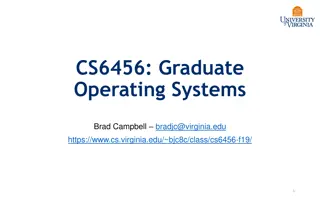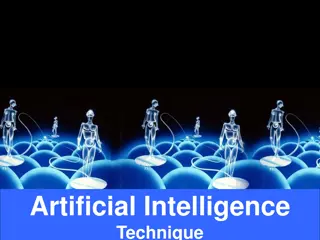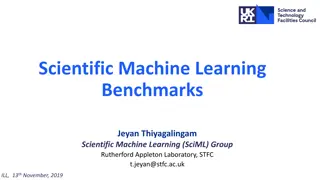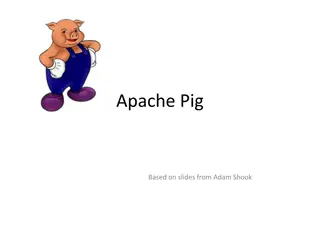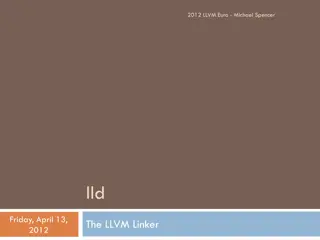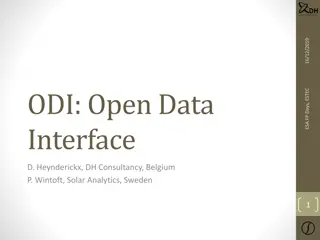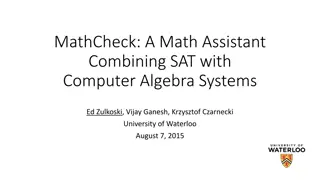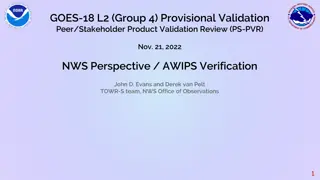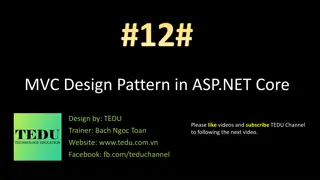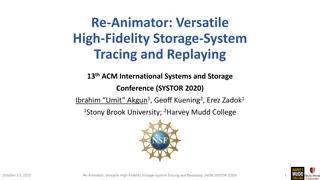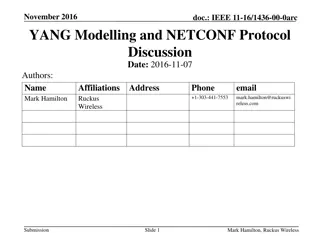Evolution of Internet Protocol: From IPv4 to IPv6
The evolution of Internet Protocol (IP) from IPv4 to IPv6 has been crucial for adapting to new technologies and addressing specific networking challenges. IPv6 offers a 128-bit address space, improved header format, extensibility, and support for a wide range of services including video, voice, and
0 views • 23 slides
Organizing Operating Systems for Efficiency and Reliability
Operating systems are complex and constantly evolving, with the challenge of managing bugs to ensure smooth operation. Different system structures such as monolithic, layered, and microkernel-based systems offer varying levels of organization and fault tolerance. Microkernel systems, exemplified by
0 views • 31 slides
Understanding Artificial Intelligence Techniques
Artificial Intelligence (AI) techniques leverage knowledge representation to achieve generalization, ease of adaptation, and problem-solving capabilities. Knowledge, although voluminous and dynamic, is crucial for developing effective AI solutions. By capturing important properties and enabling adju
0 views • 25 slides
Scientific Machine Learning Benchmarks: Evaluating ML Ecosystems
The Scientific Machine Learning Benchmarks aim to assess machine learning solutions for scientific challenges across various domains like particle physics, material sciences, and life sciences. The process involves comparing products based on large experimental datasets, including baselines and mach
1 views • 35 slides
OpenStack Liberty Release Overview
Key themes of the OpenStack Liberty release include finer grained controls for operators, improved manageability and scalability, and support for virtual machines, containers, and bare metal. The release also focuses on common library adoption, better configuration management, and role-based access
0 views • 17 slides
Avoco's Cloud-Based Information Card Selector: Enhancing Usability and Security
Avoco's Cloud-Based Information Card Selector is a leap forward in Information Card usability, offering benefits such as universal access to Information Cards, zero footprint for end users, and enhanced security features. The platform allows for easy creation, import, and backup of cards, as well as
0 views • 29 slides
Introduction to Apache Pig: A High-level Overview
Apache Pig is a data flow language developed by Yahoo! and is a top-level Apache project that enables non-Java programmers to access and analyze data on a cluster. It interprets Pig Latin commands to generate MapReduce jobs, simplifying data summarization, reporting, and querying tasks. Pig operates
0 views • 57 slides
Understanding Flexibility and Stretching Techniques
Flexibility is crucial for optimal physical performance and injury prevention. It refers to the ability to move joints through a full range of motion without restrictions. Factors limiting flexibility include tissue elasticity, bony structure, and muscle/tendon extensibility. Understanding active an
0 views • 28 slides
Exploring lld: The Next-Generation System Linker
Delve into the innovative features of lld, a system linker designed to enhance performance, portability, and extensibility in the process of producing libraries and executables. Discover its modular, embeddable nature, platform understanding, and compatibility with multiple styles and formats, offer
0 views • 22 slides
Exploring Architecture and Challenges of Proof Assistants
Explore the architecture of proof assistants, discussing the use of tactics, formal proofs, and the difficulty in utilizing these tools. Discover the contribution of a new architecture for proof assistants, addressing extensibility and error checking, with a focus on soundness guarantees. Delve into
0 views • 41 slides
Open Data Interface (ODI) Project Overview and Components
Open Data Interface (ODI) is a database system developed in 2008 for ingesting, processing, storing, and retrieving space environment data. The project involves a server, client, and various components for data manipulation and integration. Current contractors include DH Consultancy and Solar Analyt
0 views • 15 slides
MathCheck: A Math Assistant Combining SAT with Computer Algebra Systems
MathCheck is a project focused on incorporating algorithms from Computer Algebra Systems (CAS) with SAT solvers to enhance problem-solving capabilities in math, such as counterexample construction and bug finding. The goal is to design an easily extensible system with a current focus on graph theory
0 views • 15 slides
Understanding Polymorphism and Virtual Functions in C++
Polymorphism and virtual functions play a key role in C++ programming, allowing for flexibility and extensibility in code through type compatibility, type casts, pointers, inheritance, and overridden functions. By leveraging these concepts, developers can create efficient and maintainable code struc
0 views • 34 slides
GOES-18 Provisional Validation Review Summary
Validation review of GOES-18 Provisional products including cloud optical depth, cloud particle size, and sea surface temperature conducted by NWS Office of Observations. AWIPS validates and displays these products using GOES-16/17 configurations with no expected fielding issues. Detailed insights p
0 views • 9 slides
Understand MVC Design Pattern in ASP.NET Core
ASP.NET Core web applications follow the MVC design pattern, which emphasizes separation of concerns, with distinct responsibilities for the Model, View, and Controller components. This pattern ensures maintainability, testability, and extensibility of applications. Learn how each component function
0 views • 8 slides
Re-Animator: Versatile High-Fidelity Storage System Tracing and Replaying
Re-Animator is a system for capturing and replaying system calls that aims to benchmark storage systems, analyze application characteristics, and reproduce bugs. It addresses challenges in capturing accurate information, data buffers, overheads, replay tools, trace formats, and offline analysis. Wit
0 views • 18 slides
Enhancing Logical Grouping Mechanisms in Haystack Labs
Formalizing a logical grouping mechanism to standardize practices, promoting extensibility and alignment with existing work in Haystack Labs. Examples illustrate the flexibility and advantage of the system.
0 views • 9 slides
Introduction to YANG Modelling and NETCONF Protocol
This presentation from November 2016 provides a brief introduction to YANG modelling and the NETCONF protocol for managing system configuration. It discusses the purpose and benefits of YANG, highlighting its role as a data modeling language for the NETCONF protocol and detailing its features such a
0 views • 6 slides
